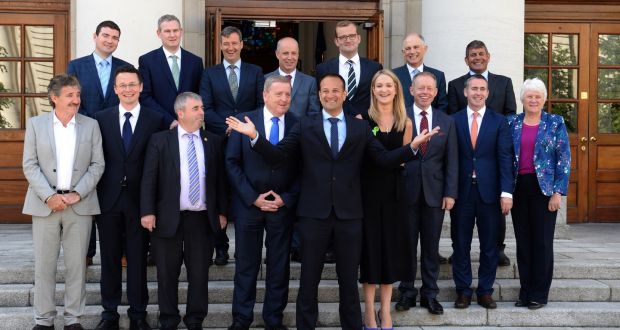AH, Baile Átha Cliath.
A previous article from our “Election-earing” theme back in Autumn caught my interest. It was called the Haunted Halls of Parliament and most interestingly had a section on the transformative nature of participation in electoral politics through parliament and the structures connected to it. I’m going to add to this article and give another reflection on parliamentary politics by focusing on an analysis of the role of TDs and the civil service.
Teachtaí Dála (TDs) in Ireland are members of the lower house of our legislature, an archaic system that was cribbed directly from the Westminster model, with a lick of green paint in the pattern of the broader “green mail box” approach to decolonisation. They are elected on a constituency basis of 1 member for every 20,000 people. The other, less dominant, upper house of the Oireachtas is the Seanad. Article 15 of the Constitution of the 26 counties invests the legislature, the parliament, with “the sole and exclusive power of making laws”. The Constitution invests Dáil Eireann with supreme legislating power, as long as it is not repugnant to the constitution — something easily circumvented, but that’s a matter for another time, and something I’ve covered in the past in this article on the separation of powers.
What is more of interest is the suspicious nature in which the organised and disorganised left in Ireland gravitate towards accumulating TD and Council positions. They measure their success through this form of strategy and make the claim that it popularizes socialism and advances the struggle for the working class. Based on my experience of working in a constituency office and engaging in parliamentary politics, I will lay forward an alternative analysis, lending my current experience and cross-examining the contemporary trends of social democratic opportunism.
Before I do so, I will highlight and remind readers that Connolly and Lenin alike identified the State as run by capitalists — to be managed exclusively in the interests of capitalists. Connolly commented on the State being a “committee of the rich to manage the affairs of the rich” while Lenin wrote a pamphlet, one month before a revolution titled State and Revolution that strenuously picked apart the arguments of the then reformists: “To decide once every few years, a few years which members of the ruling class are to repress and crush the people through parliament.”
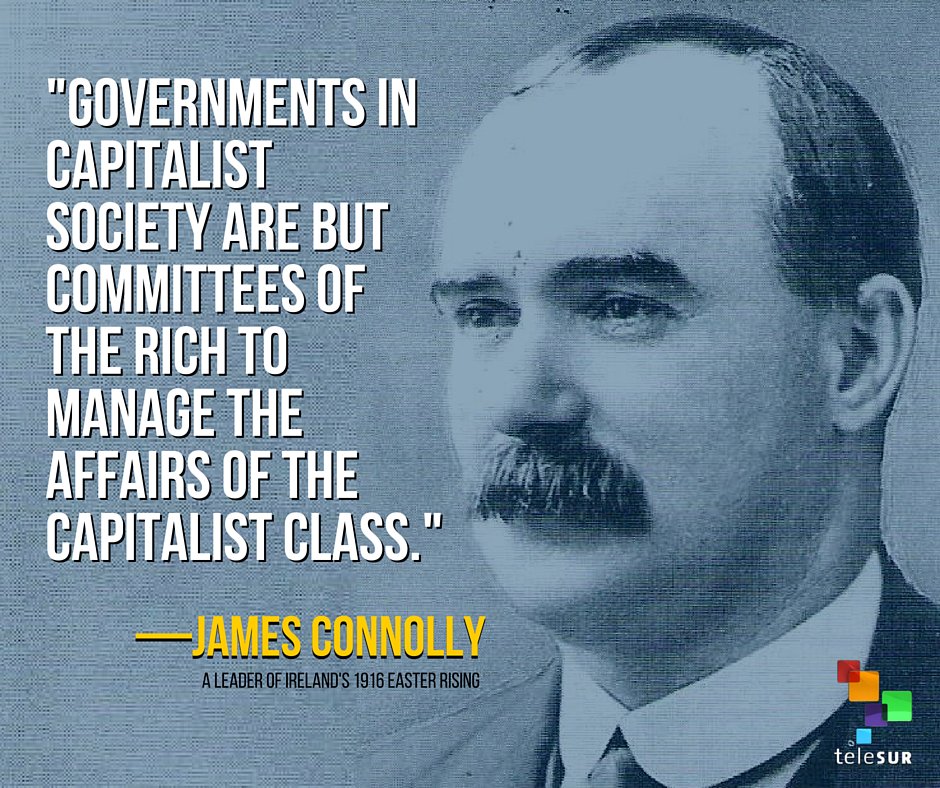
These words of Connolly and Lenin still ring true, those who in their own time could see through the facade of capitalist “freedom” and “democratic rights”. Today is no different — the people in Ireland, who are eligible to vote in the General Election can come out from time to time and pick from a competing set of political parties and independents, all of whom are by the way, largely offering different personality flavours of the same policies and present largely the same solutions to the economic contradictions and problems of the day. Some choice, of course, exists on the historical connections of different parties. Fine Gael for example were founded by fascists while Fianna Fáil tricked generations of decent Republicans and Communists into believing they were going to do something good for the working class. Labour, “the Party of Connolly” has since the day Connolly died betrayed his legacy so many times that their reputation is beyond infamy and disgust in every corner of the working class, and their leadership is so viciously and avowedly anti-working class that it is more irredeemable than the worst reactionaries.
The new “left” are the numerous Trotskyist sects that have colonised Ireland since the 1970s at the behest of their British sister-organisations, beginning with the arrival of the SWP (Now People Before Profit) in the 1970s and the Militant Tendency (now Solidarity) in the 1980s. Since then, they have wormed their way into many trade unions and communities and to this day have failed to grow beyond a handful of members in the core organisation that the leaders of their fronts are selected from. With high turnover, limited electoral success and almost a million euro in state funding a year — one must ask the pertinent question of how and why can their work be going so badly wrong?
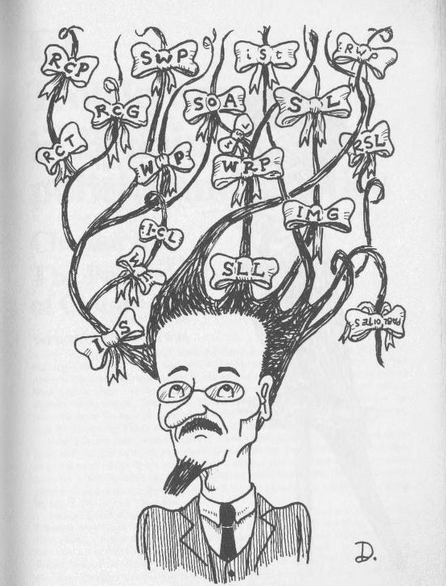
There are several arguments to be made here and the arguments are not strictly limited to the failings of the Trotskyist parties to become anything more prominent than a canvassing framework behind careerist student protest groups. The arguments, in fact, identify how the models of the State, the Parliament, the electoral process, the two and a half party system, the dominance of Dáil Eireann, the supremacy of the executive and the role of the constituency office and TD all function.
The State
We have had no government since the 8th of February, yet all functions of our society continue to carry on. To an inquisitive mind, the question must arise: How? If we in our democracy have no government, how can the State continue to function? One of the greatest successes of Western social democracy was to create such a vast army of bureaucrats that parliamentary results would barely impact the “business of the state”. Again, let us quote Lenin when he refers to the provisional government:
“In the government a sort of permanent shuffle is going on in order that, on the one hand, as many Socialist Revolutionaries and Mensheviks as possible may in turn get near the ‘pie’, the lucrative and honorable posts and that, on the other hand, the ‘attention’ of the people may be ‘engaged’, meanwhile the chancelleries and army ‘do’ the business ‘state’.
The State carries the true and real decision making power, the body of parliamentary TDs who shuffle and mumble, get caught in newspaper scandals, meet with questionable figures in and outside of Ireland, sometimes write character references for convicted sex offenders and so on, are mainly a distraction and a scapegoat that absorbs the tumult of politics.
The State, the Department of Finance and the other 14 Ministries continue to function and carry on in the service of Capital with a capital C. These ministries are safeguarded by various rules and regulations and know that regardless of who comes to power. their positions are well kept and their policy agenda is relatively stable. It is worth adding to this the layer of civil servants who carry out the priorities of the state on a day to day basis and also likely form a part of the electoral voting bloc that supports the two and a half party system.
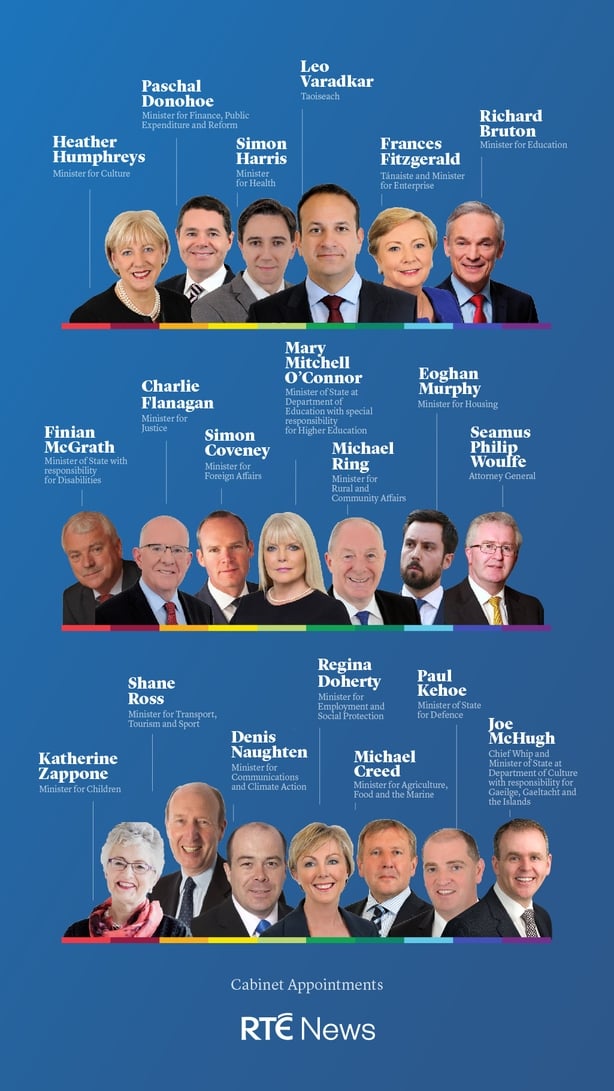
The Dáil
The Dáil is a circus — filled with some of the biggest performers and the greatest clowns. If the major political party can dominate the Executive and carries a majority vote in the Dáil, then the Dáil is a comical and performative husk for democracy. Elected representatives cannot be recalled and are accountable only to the party which they come from. They can do nothing and be completely inactive while working elsewhere, or be extremely active, vocal in the committees and the chamber but still ultimately providing a net benefit of zero to the working class. As my comrade comments in the article Haunted Halls of Parliament, the questioning process is so deflated, so undermined that the entire premise of being an ‘opposition’ voice is flushed down the drain. After all — we must uphold ritual, custom and respect!
At this moment in time we have had an historic breakthrough electorally as the duopoly that Fine Gael and Fianna Fáil enjoyed has been broken. Their voters have nothing to fear and neither do their minions and acolytes. They have agreed to form a government together. Nevertheless, one strand of “revolutionaries” has taken to calling this coalition a “stitch up”. There is no stitch up. This is effectively how bourgeoisie democracy functions and how the Irish “democracy” functions. It is all about who controls the parliament and from there on, the Executive reigns supreme. In saying this, I fully acknowledge that the people voted overwhelmingly for a change in how things are done and that is mandated enough to campaign for and be encouraged by.
The Electoral Process
The electoral process is farcical in Ireland. Once every five years, or four, or whenever is suitable to the representatives of Capital, we vote. We vote on the basis of promises that are almost routinely broken and they are broken by all of the different shades that populate the parliament. They are broken because those running are clever enough to know that they will have to break them.
Many parties call for change but like Syriza in Greece, refuse to recognise or acknowledge the fact that no real change is possible without violating Ireland’s international commitments to neoliberal capitalism. If the relationship that Ireland has, with foreign capital, with the British Empire, with the European Union and the American Chamber of Commerce is not recalculated to be of benefit to the people of Ireland then every party running on a programme of change is deceitful to the people and to itself.
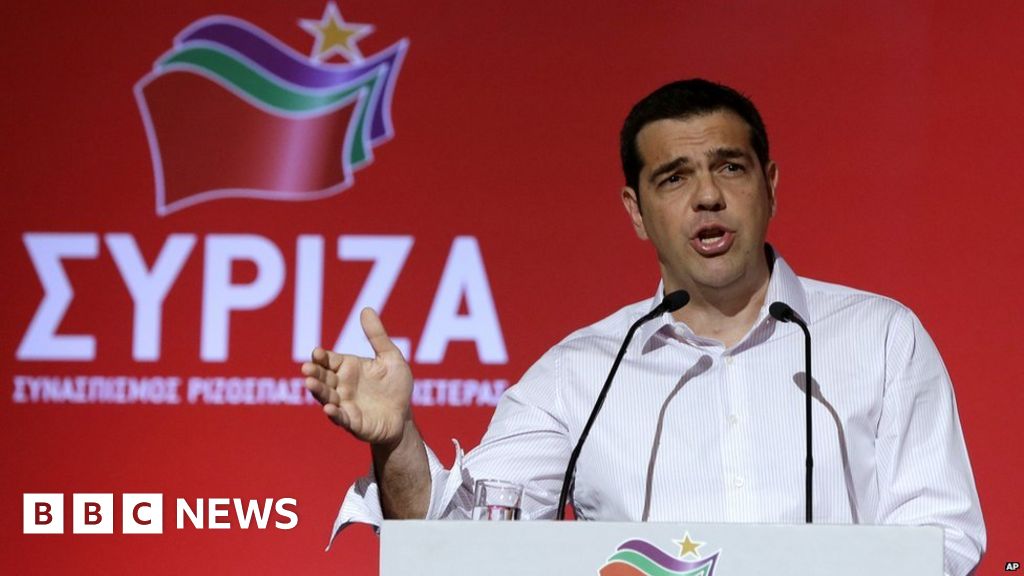
The electoral process itself is tedious, it does not offer engagement with the working class and is limited. Have you ever canvassed? If so — how long are the conversations you have with the person you are canvassing? Does that person often get engaged beyond lending you their criticism of your views or of another party’s views? Do you recruit them into your brand of revolution as a result of canvassing? In the majority of cases the canvassing process is boring, repetitive and highly disengaging. It is a rubber stamp on the conventions and casual motions of liberal democracy. This is not because you are boring — although you might be, it is because having people knock on your door to beg for your vote is one of the lowest forms of politics one can imagine. The only functional benefit for a canvasser is that you get a bit more tuned in with the atmosphere on the ground in a certain community.
The electoral process is suitable to political parties — that can work their constituencies well and ensure that votes are rewarded. This is not an allegation – parish pump politics are a matter of life or death. The process itself is contradictory for anybody who aspires to the social ownership of the means of production and fully agrees with the dictatorship of the proletariat. If you are engaged in electoral politics your programme must either be in conformity with what can be presented as a measure of your electoral success, or in total breaking with the limitations of social democracy.
That is to say that if you run a candidate or selection of candidates then you have to make a conscious choice: Do you raise demands that can be achieved through legislative changes or do you put forward items on the programme that are impossible to achieve but are programmatically linked to what your party is struggling for?
The Two and a Half Party System
Since this rotten State was cobbled together by the predecessors of Fine Gael and the class traitors of the Labour Party — two political parties have dominated every single election until 2011. It was and is called “civil war” politics because of the two parties that took turns dominating every single aspect of the State, in cahoots with the rotten Roman Catholic Church. More notably, after the civil war, those IRA members who fought for the anti-treaty side had significant difficulty in accessing their legitimate pensions for fighting against the British occupation.
The civil servants, the judiciary and the many appointments that the State can make, were made. The same is true today. Despite there being a rule forbidding civil servants being members of political parties, you can very well guarantee this is not a prohibition so much as you need to be associated with the right political party.
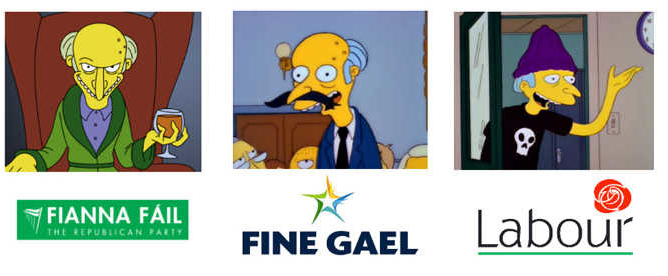
He who pays the piper is the saying that goes — and it stands true for the civil service in Ireland which runs the day to day affairs of our statelet. The Two and Half Party system essentially ensures that the positions of well-paid civil servants are untouched — in return, they vote consistently for the same coterie of political parties that represent their economic interests. The same can be said for the whole host of interests in the private sector that Fine Gael and Fianna Fáil have carefully constructed their political programme around.
Dominance of Dáil Eireann & Supremacy of the Executive
Once you possess a majority vote in the Dáil, as a single party or in arrangement with another, you can rule and do as you wish. Mechanisms for transparency, accountability, right of recall, and direct election are non-existent. Freedom of Information requests are shrouded either in secrecy or have relatively significant costs associated with them.
Once a party forms a government, the opposing TDs, all those not part of the government faction, just continue to exist. Their functions are limited to asking questions from time to time in a polite manner and saying a few things in the Dáil itself. The question is: Is this an expression of democratic power or a demonstration of its weaknesses and limitations?
The TD: Parliamentarian, Community Worker, Social Worker, Revolutionary and more?
Left TDs occupy a variety of roles as soon as they are elected. Their constituency office becomes a place where constituents, namely those who voted for them or others in distress, come to have their problems resolved. You can imagine that being a TD within a major party organisation like Fine Gael, Fianna Fáil or Labour probably expedites the resolution of any problems, while being an Independent TD or part of one of the micro-left groups makes the process significantly slower.
The TD is, in reality, burdened with picking up the functions that civil authorities should be taking care of. It is not the office of a TD that a worker, tenant, farmer or student should come to because they have an issue with an illegal eviction or an unfair dismissal or any other number of issues, but a competent civil authority run in the interest of the common person. What becomes of the TD is that they become a constituency worker and their officer becomes a social workers’ office. Do not misunderstand me, I am not stating that this is a negative thing, some left and independent TDs do good work. What I am stating is that it is not their job to perform these functions.
In fact — the reason that they are performing these functions is because local, municipal and national services continue to be chipped away with the scalpel of privatisation. Elderly people in particular find nobody to turn to but the local representative that’s down the road or who they have known for prolonged periods of time. The lines become blurred — as a TD and their constituency office is seen as an emergency help clinic and nothing more. This is a deliberate method of organising bourgeois democracy. It transforms the functions of the newly elected party representative because they are immediately diluted and wrapped in the trappings of ritualism, ceremonies and rules. It diverts the energy especially of radical TDs who can’t help but care and make a considerable personal effort and time commitment to championing the concerns of their constituents. It dilutes the radicalism that the TD might have had before coming in — either as an individual or in a group, unless they are literally a member of the government, their power to influence change is dramatically limited to essentially asking pointed questions.
What is then the role of electoral politics and having elected officials?
Seamus Costello, a more recent revolutionary thinker, commented on the matter as such:
“I favour guerrilla tactics in parliament, the same as I do in many other respects, I favour them also in local elections and in local government bodies, they’ve proved successful there. I see no reason why, with a few MPs or a few TDs of a higher calibre, pursuing the right policies why they cannot destroy the confidence of the people in these institutions and bring them tumbling down in ruin.”
The role of the Socialist or Communist organisation is to seek the elimination of the capitalist state and to replace and to construct a proletarian state in its place. The tactics and strategies that the party undertakes denote its objective — often we see parties talk out of two sides of their mouth. On the one hand they claim their commitment to socialism and on the other hand their programme is half baked radicalism with promises of taxing this person and that person.

Revolutionary politics is not a question of appeasement or the occupation of a few seats. In order to overcome partition and run the Yankee and British imperialists out of Ireland, we must present and articulate a scientific analysis of how civil, political, administrative and judicial institutions function in relation to the limited expressions of democracy.
Our engagement with electoral politics must remain strict and to the point. We run candidates to popularise a programme that cannot be delivered through elections. We run candidates to recruit members and build new branches in areas that might have potential for them. We run candidates to use the platform to talk about revolution and the need to destroy the parties that delivered misery. We run candidates to break all liberal ideas of civility and niceties, to be crude to our enemies, to attack them and to disgrace them — to ensure that they know we are their enemies and will not abide by their rules. We run candidates, in subordination to a common, extra-parliamentary struggle that in, understanding the irredeemable and irreformable nature of the state has only its destruction as its objective. We run candidates, as Seamus Costello points out, to wage a guerrilla war the sole objective of which is bringing these institutions into complete destruction and rebirth.
Political power must be re-created from the earth, from the mass organisations and it must find political expression only in representation of the interests of its mass organisations and in contradiction to the interests of the capitalist class — not in compromise. A strategy that has electoral politics at its centre will always end in compromise, disillusion and defeat.

